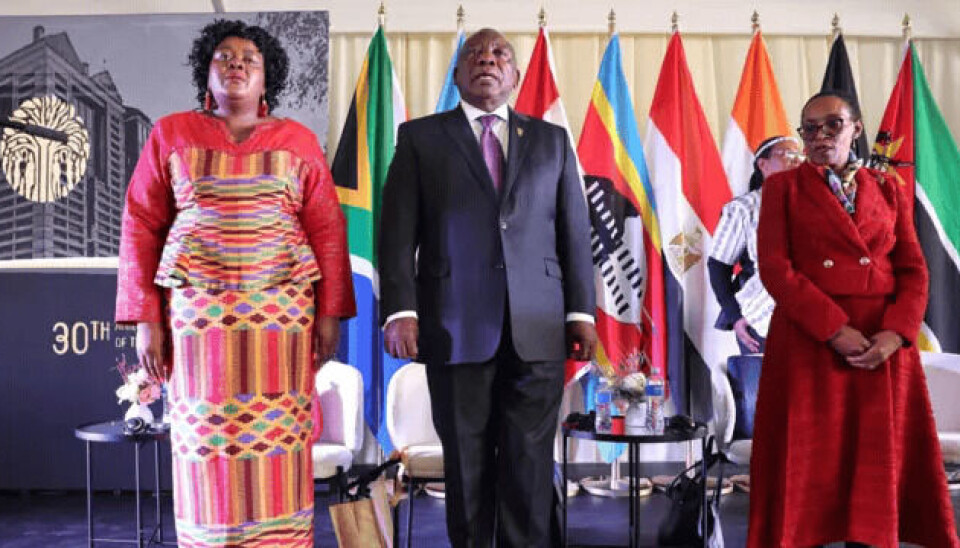Copyright : Re-publication of this article is authorised only in the following circumstances; the writer and Africa Legal are both recognised as the author and the website address www.africa-legal.com and original article link are back linked. Re-publication without both must be preauthorised by contacting editor@africa-legal.com
South African judiciary to have independence very soon, promises President Ramaphosa

Following years of calls from judges and others, and meetings with the Chief Justice earlier this month, President Cyril Ramaphosa has announced plans to make South Africa’s judiciary fully independent in the near future.
Judges and legal commentators have welcomed South African President Cyril Ramaphosa’s strong commitment, in a speech celebrating the 30th anniversary of the Constitutional Court, to take action to ensure full judicial independence and the separation of powers between the executive, legislature, and judiciary.
“To ensure that the judiciary execute their duties independently, effectively, and with dignity - government must and will provide a range of institutional, infrastructure, financial, administrative, and legal support,” said Ramaphosa on Friday, emphasising that judicial independence is a cornerstone of democracy and the rule of law.
The President acknowledged the financial challenges currently facing South Africa, but said that would not prevent the empowerment of key democratic institutions.
“Enhancing access to justice and improving court services has been allocated for in this year’s budget, and there have been increases for improving superior court services, for judicial education and support, for the filling of vacant posts and to address other funding shortfalls,” he continued. “We reaffirm our commitment to providing all the necessary support to our courts as they administer justice.”
Earlier this month, Ramaphosa, supported by Minister of Justice and Constitutional Development, Mmamoloko Kubayi and Deputy Minister Andries Nel, hosted a high-level engagement with Chief Justice Mandisa Maya and Heads of Court at Mahlamba Ndlopfu, the President’s official residence in Pretoria.
The result of those discussions, revealed Ramaphosa on Friday, is a government commitment to advance the independence of the judiciary and the future of South African courts’ administration. “A joint committee will develop an action plan to be finalised six weeks from now. We will ensure the Judiciary is rightly constituted as an equal branch of government with the Legislature and the Executive.”
Yesterday, Judges Matter, a research and advocacy project dedicated to enhancing transparency and accountability within South Africa’s judiciary, praised Ramaphosa’s commitment to strengthen the institutional, administrative, and financial independence of the judiciary. “We welcome the President’s announcement of concrete actions to establish the judiciary as a co-equal branch of government, alongside the Executive and the Legislature. This is a vital step forward.”
Judges Matter notes the President’s promise signals a restarting of governance reforms to ensure full independence of the judiciary that were originally initiated in 2009 by then Chief Justice Sandile Ngcobo, working with then Justice Minister Jeff Radebe and President Jacob Zuma, only to stall nearly a decade ago.
The South African judiciary remains a trusted institution in a country where trust in public bodies is at an all-time low, notes Judges Matter.
However, while South African judges have independence in terms of decision-making - as illustrated by Ramaphosa’s speech praising some of the Constitutional Court’s landmark decisions over its three decades - the courts’ fragmented funding and financial and administrative dependence on the Executive undermines their professed ability to protect rights fairly and without fear or favour.
“Court infrastructure, IT services, security, even library resources, are still controlled by the Department of Justice and other executive agencies. This system leaves courts vulnerable when resources are insufficient, misallocated, or delayed.”
So it was a watershed moment when Ramaphosa met with Chief Justice Maya earlier this month, to revive the reform drive for full judicial independence.
Judges Matter urges parliament, civil society, legal professionals, and the general public to ensure this momentum results in lasting reforms — including improved court governance, better judicial support, and full compliance with court orders.
